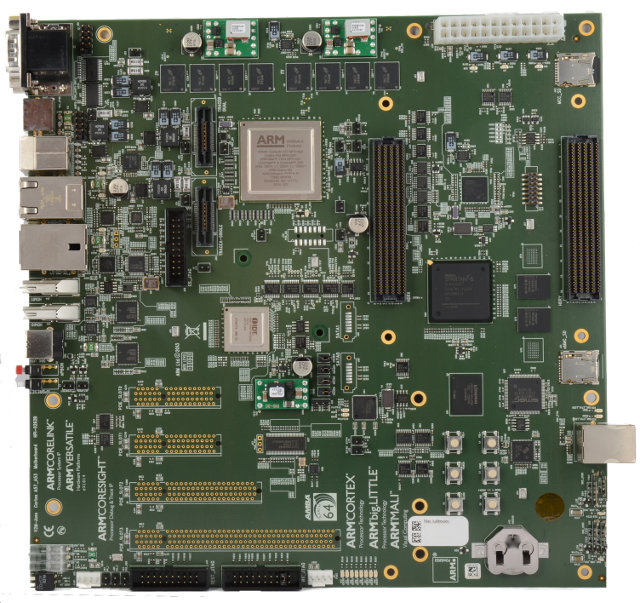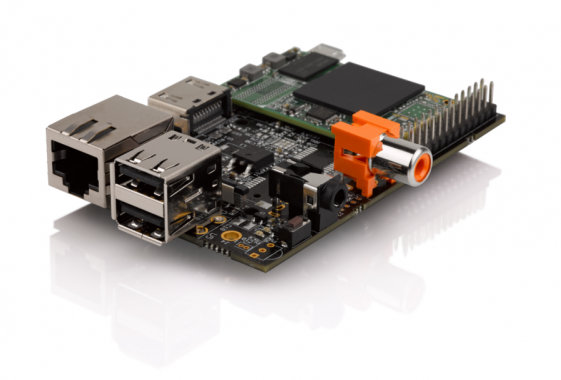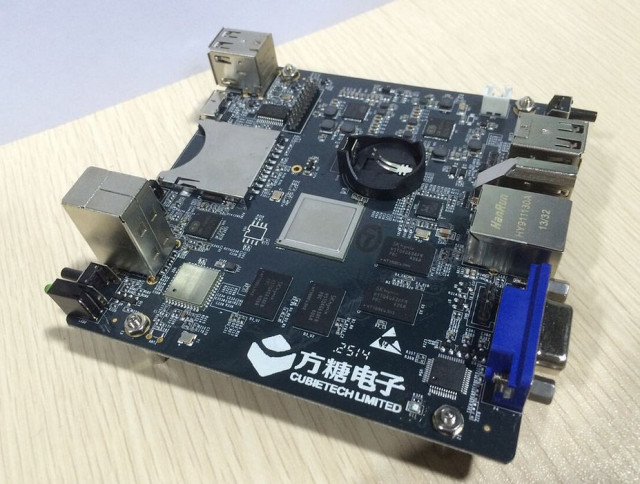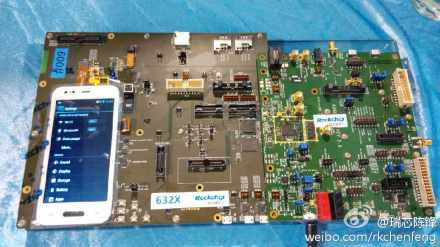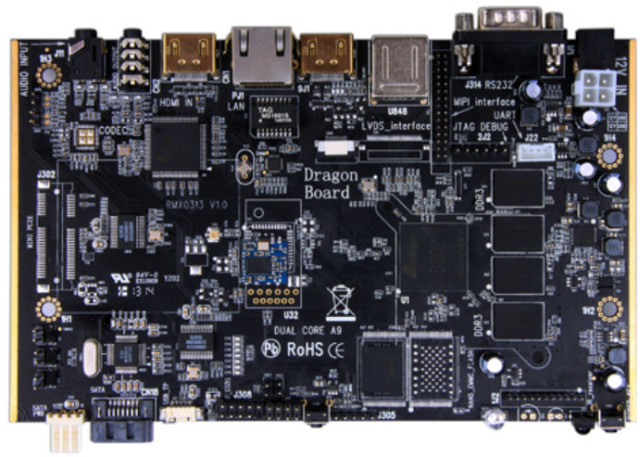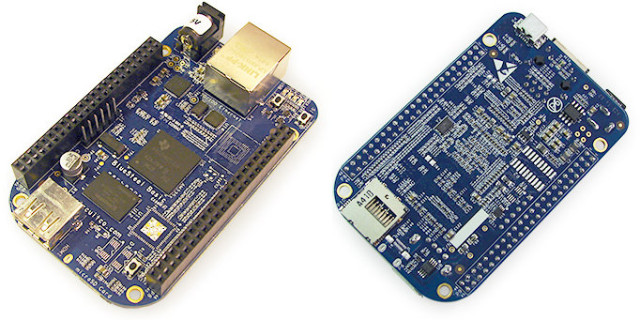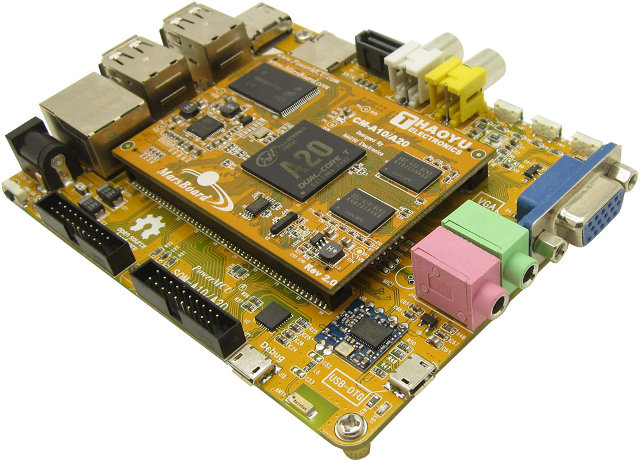Last week, Linaro 14.06 was released and one of the highlights was Android booting on ARMv8 models, but the organization has actually ported Android to a new 64-bit ARM platform. Juno ARM Development Platform is actually software development platform for ARMv8-A, including Juno Versatile Express board and an ARMv8-A reference software port developed by Linaro. Juno VExpress Board has the following key hardware features: SoC – 2x ARM Cortex A57 cores @ 1.1 GHz (2MB L2 cache), 4x Cortex A53 cores @ 850 MHz (1MB L2 cache) in big.LITTLE configuration with Mali-T624 GPU @ 600 MHz. Compliant with SBSA specifications Level 1. I/O FPGA – Xilinx SPARTAN-6 MCU – ARM Cortex M3 for Motherboard Configuration Controller (MCC) System Memory – 8GB DDR3L @ 1600 MHz Storage – User and configuration micro SD card lots, 64MB NOR flash, configuration EEPROM Connectivity – 10/100M Ethernet + 10M “configuration” Ethernet Video Output – […]
SolidRun HummingBoard Raspberry Pi-Like Board is Now Available for $45 and Up
HummingBoard is a board made by SolidRun that’s mechanically compatible with the Raspberry Pi, and offering the same expansions connectors, and a few extras. The board is comprised of a baseboard and a microSoM powered by Freescale i.MX6 Solo, Dual Lite or Dual. At first it looked like an internal project, but the board went viral together with the Banana Pi, and the company has now announced availability for the HummingBoard with pricing starting at $45 for the single core version up to $100 for the dual core version with extra options. There are currently three models: HummingBoard-i1 ($44.90) – Freescale i.MX6 Solo with GC880 GPU, 512 MB RAM, 10/100M Ethernet HummingBoard-i2 ($74.99) – Freescale i.MX6 Dual Lite with GC880 GPU, 1GB RAM, 10/100M Ethernet HummingBoard-i2ex ($99.99) – Freescale i.MX6 Dual with GC2000 GPU, 1GB RAM, Gigabit Ethernet, LVDS output, mSATA II interface, PCI Express Gen 2 slot, RTC with […]
Pictures and Specs for CubieBoard 8 Development Board Powered by AllWinner A80 SoC
Back in April, AllWinner announced partnerships with Linksprite and CubieTech for respectively PcDuino 8 and Cubieboard 8 development boards to feature AllWinner A80 octa core ARM Cortex 15/A7 big.little SoC. However, at the time all we got was some photo-shopped pictures of older versions of the boards with an A80 processor pasted by graphics designers. Some pictures of Cubieboard 8 have now surfaced, and they are clear enough so that we can start to get most of the specs. Here are Cubieboard 8 specifications derived from the pictures (incomplete because we don’t have pictures of the back of the board): SoC – AllWinner A80 octa core big.LITTLE processor with 4 ARM Cortex A15 cores, 4 Cortex A7 cores, and Imagination PowerVR G6200 GPU System Memory – 2GB DDR3 (4x SKhynix H5TQ4G83AFR – 4Gbit RAM chips) – TBC in case they’ve added more RAM chips at the back, unlikely IMHO. Storage […]
Amptek iCon is an ARM Cortex M3 Board for IoT Running uCLinux (Crowdfunding)
Up until now, the only company I ever heard running Linux on ARM Cortex M3/M4 was EmCraft Systems with their system-on-modules and development kits based on Freescale Kinetis, STMicro STM32 and Actel Smartfusion micro-controllers. But there’s now another option thanks to Ampek Technologies, a Canadian based company funded in 2002, and their iCon (Internet Connectivity) board featuring NXP LPC1788 Cortex M3 connected to 64MB RAM which is plenty enough to run uCLinux. The board can be used for applications such as industrial control systems, wireless sensors, or smart home appliances. The iCon board specifications are as follows: MCU – NXP LPC1788 ARM Cortex-M3 MCU @ 120MHz with 512 KB flash memory, and 96 KB SRAM System Memory – 64MB SDRAM (external chip) Storage – 32MB flash for firmware Connectivity – 802.11 b/g/n, Bluetooth 4.0. Ethernet is supported via an add-on module USB – USB 2.0 host port, mini-USB debug port […]
Development Board with Intel Technology Developed by Rockchip
Just a quick post to show an interesting, yet unavailable development board. A few weeks ago, Intel and Rockchip announced a collaboration to design Intel Atom Sofia x86 SoC for mobile devices. Apparently, they did not waste any time, and have already done some nice work together, as Chen Feng, VP at Rockchip, posted the picture of the development board on his weibo account with a short description that Google’s translate as: You can now showed up, Intel inside, the world’s most highly integrated 6321 smartphones and tablet communications solutions, dual-core WCDMA SOC, integrated WIFI BT GPS PMU, all two chips It’s not entirely clear if it’s directly related to the announced Intel Atom “Sofia” using 3G (WCDMA) however. The 6321 is a dual core processor, but Rockchip and Intel only announced working on quad core processors, so this may be a separate product for example an ARM SoC with […]
Geniatech Announces Dragon Board Industrial SBCs Powered by Amlogic Dual and Quad Core Processors
Not to be confused these DragonBoards, Geniatech has announced two industrial single board boards, namely Dragon Board I and Dragon Board II, respectively powered by Amlogic AML8726-MX dual core Cortex A9 SOC, and S801/S802/M805 quad core Cortex A9r4 SoC, and targeting applications such as digital signage player, and display applications for the hospitality industry. Let’s go through the specifications of both boards: SoC Dragon Board I (DB I) – Amlogic AML8726-MX dual core ARM Cortex A9 @ 1.5GHz with Mali-400MP2 GPU Dragon Board II (DB II) – Amlogic S802 quad core ARM Cortex A9r4 @ 2GHz with Mali-450MP6 GPU System Memory DB I – 1GB (1600Mbps data rate) DB II – 2GB (1600Mbps data rate) Storage – 4GB NAND flash (up to 32GB as option), micro SD card slot, SATA interface Video I/O Common – HDMI output, LVDS, and CVBS. DB I only – VGA DB II only – HDMI input […]
The BeagleBone Black Turns Blue with BlueSteel-Basic, Loses HDMI and Flash
CircuitCo has just introduced BlueSteel-Basic, a development board based on the Beaglebone Black but with a Blue PCB, no HDMI output, and no eMMC flash that’s destined to be used by OEMs in their products. LinuxGizmos also reports that BlueSteel-Basic is to be followed by BlueSteel-IT, an industrial temperature grade (-40 to 100°C) board based on the Beaglebone Black, and Bluesteel-Core, a computer-on-module (CoM) based on Ti Sitara AM335x that are scheduled for July 2014. Let’s checkout BlueSteel-Basic specifications: SoC – Texas Instruments Sitara AM3358BZCZ100 @ 1GHz (2000 MIPS) with PowerVR SGX530 3D GPU (20M Polygons/S) System Memory – 512MB DDR3L @ 800MHz Storage – micro SD slot Connectivity – 10/100M Ethernet (RJ45) USB – 1x USB 2.0 host port, 1x mini USB 2.0 port Debugging – Serial header and optional on-board 20-pin CTI JTAG Expansion Connectors Signals: Power 5V, 3.3V, VDD_ADC (1.8V) 3.3V I/O On All Signals McASP0, SPI1, […]
There’s a New MarsBoard A20 ARM Linux Development Board In Town
MarsBoard, a development board based by AllWinner A10 was released last year, soon followed by MarsBoard A20 with a dual core Cortex A7 AllWinner A20 processor. That board is now called the “Old MarsBoard A20” and is replaced by the “New MarsBoard A20” that features a baseboard + computer-on-module design, increases the NAND flash capacity to 8 GB flash, and supports 1GB RAM by default, with an option for 2 GB RAM. Let’s check the specifications of this new development board: SoC – AllWinner A20 ARM Cortex A7 dual core processor @ 1GHz + Mali-400 GPU System Memory – 1GB DDR3 @ 480 MHz by default, up to 2GB DDR3 Storage – 8GB NAND Flash, SATA II interface, and micro SD slot Video I/O HDMI up to 1080p60 VGA Composite output TV-IN (composite IN) LCD connectors for RGB and LVDS interfaces, capacitive touch support Audio I/O – HDMI, Line In/Out, Microphone […]


